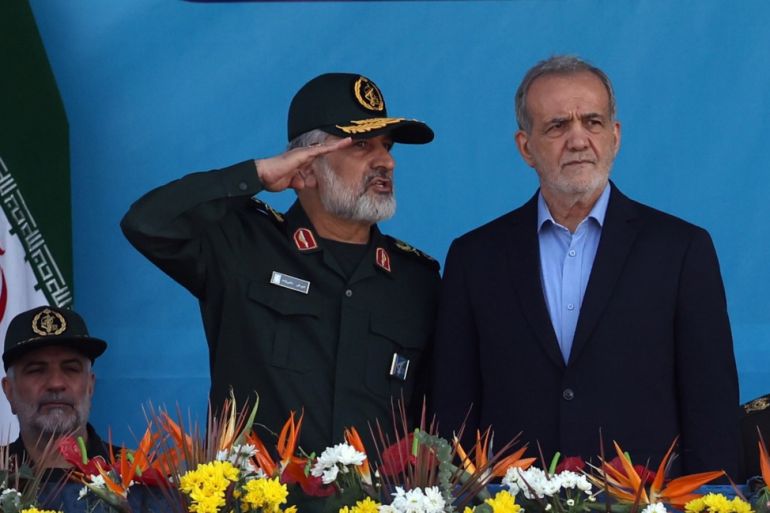Iran says it will suspend cooperation with UN’s nuclear watchdog
President Masoud Pezeshkian also says that Tehran will ‘overcome obstacles’ if wide-ranging UN sanctions are reimposed.

By Ted Regencia and News Agencies
Published On 21 Sep 202521 Sep 2025
Save
Iran’s top security body has warned that action by France, Germany and the United Kingdom to reimpose international sanctions will “effectively suspend” its cooperation with the United Nations nuclear watchdog.
The warning from the Supreme National Security Council came on Saturday, a day after the United Nations Security Council (UNSC) failed to adopt a resolution to permanently lift sanctions against Iran.
Recommended Stories
list of 3 itemsend of list
That vote was called after the three European nations launched a 30-day process on August 28 to reimpose UN sanctions on Iran, claiming that Tehran has violated a deal it signed in 2015 to curb its nuclear programme.
Russia and China, which are also signatories to the deal, have both rejected the bid to trigger the “snapback” sanctions.
Iran’s Supreme National Security Council, which is chaired by President Masoud Pezeshkian, called the action taken by the three European nations, who are known as the E3, “ill-considered”.
It said the move undermined months of engagement with the International Atomic Energy Agency (IAEA) aimed at resuming monitoring and ensuring compliance with international rules.
“Despite the cooperation of the Ministry of Foreign Affairs of the Islamic Republic of Iran with the [IAEA] and the proposals presented to resolve the [nuclear] issue, the actions of European countries will effectively suspend the path of cooperation with the Agency,” the council said.
It went on to order the foreign ministry to “continue its consultations within the framework of the decisions of the Supreme National Security Council to protect the country’s national interests”.
Earlier this month, Iran and IAEA had reached a deal on resuming inspections at Iranian nuclear sites – including those targeted by the United States and Israel in June – following a meeting in the Egyptian capital, Cairo.
Advertisement
Iranian Deputy Foreign Minister Kazem Gharibabadi also told Iran’s IRIB television that the recent agreement reached with the IAEA in Cairo will be “completely stopped…if nothing special happens in the field of diplomacy”.
Under the Joint Comprehensive Plan of Action (JCPOA) – signed by Iran, China, Russia, the United States and the E3 – Tehran had agreed to curb its nuclear programme in return for sanctions relief. But the agreement unravelled in 2018 after then-US President Donald Trump pulled out and imposed unilateral sanctions.
The IAEA said earlier this year that Iran now posses more than 400kg (882 lbs) of uranium enriched to 60 percent purity, just below weapons grade.
Iran insists that its nuclear programme is peaceful.
The vote at the UNSC on Friday means the “snapback” sanctions could take effect as early as next Sunday.
These would include the reimposition of an arms embargo against Iran, a ban on uranium enrichment and reprocessing, a ban on activities with ballistic missiles, and a punishing global asset freeze as well as travel bans on Iranian individuals and entities.
The E3 had previously offered to delay the snapback for up to six months if Iran restored access for UN nuclear inspectors and engaged in talks with the US.
As the threat of far-reaching sanctions looms, a defiant Pezeshkian pledged on Saturday that Iran will “overcome obstacles” that will be imposed on the country, adding that “the ill-wishers of this territory cannot block our way”.
“It is totally impossible to stop those who possess the will, determination and ability to advance,” Pezeshkian was quoted by Iran’s national broadcaster, Press TV, as saying.
“We have never bowed and will never bow to excessive demands because we have the power to bring about change,” he added.
Referring to the US-backed Israeli attack on Iran’s nuclear sites, including at Natanz and Fordow, the president also said that while Iran’s “enemies” sought to destroy those facilities, Iranian specialists and scientists “will rebuild” them.

